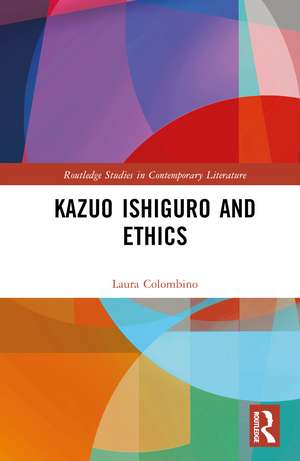Kazuo Ishiguro and Ethics: Routledge Studies in Contemporary Literature
Autor Laura Colombinoen Limba Engleză Hardback – 9 dec 2024
Din seria Routledge Studies in Contemporary Literature
-
 Preț: 309.27 lei
Preț: 309.27 lei -
 Preț: 279.74 lei
Preț: 279.74 lei -
 Preț: 310.65 lei
Preț: 310.65 lei -
 Preț: 326.49 lei
Preț: 326.49 lei - 5%
 Preț: 293.92 lei
Preț: 293.92 lei -
 Preț: 281.18 lei
Preț: 281.18 lei - 20%
 Preț: 295.91 lei
Preț: 295.91 lei - 18%
 Preț: 1053.16 lei
Preț: 1053.16 lei - 26%
 Preț: 763.31 lei
Preț: 763.31 lei - 26%
 Preț: 763.78 lei
Preț: 763.78 lei -
 Preț: 408.38 lei
Preț: 408.38 lei - 18%
 Preț: 1052.35 lei
Preț: 1052.35 lei - 18%
 Preț: 1007.06 lei
Preț: 1007.06 lei - 12%
 Preț: 325.34 lei
Preț: 325.34 lei -
 Preț: 444.62 lei
Preț: 444.62 lei - 18%
 Preț: 1002.95 lei
Preț: 1002.95 lei - 18%
 Preț: 1000.27 lei
Preț: 1000.27 lei - 30%
 Preț: 847.75 lei
Preț: 847.75 lei - 18%
 Preț: 1105.56 lei
Preț: 1105.56 lei - 18%
 Preț: 1057.75 lei
Preț: 1057.75 lei - 26%
 Preț: 764.20 lei
Preț: 764.20 lei - 18%
 Preț: 1109.18 lei
Preț: 1109.18 lei - 26%
 Preț: 765.04 lei
Preț: 765.04 lei - 5%
 Preț: 395.41 lei
Preț: 395.41 lei - 12%
 Preț: 312.43 lei
Preț: 312.43 lei - 12%
 Preț: 312.43 lei
Preț: 312.43 lei - 26%
 Preț: 764.30 lei
Preț: 764.30 lei - 23%
 Preț: 832.88 lei
Preț: 832.88 lei - 12%
 Preț: 325.34 lei
Preț: 325.34 lei - 5%
 Preț: 1220.12 lei
Preț: 1220.12 lei - 26%
 Preț: 763.89 lei
Preț: 763.89 lei - 28%
 Preț: 822.54 lei
Preț: 822.54 lei - 18%
 Preț: 1002.63 lei
Preț: 1002.63 lei - 18%
 Preț: 699.21 lei
Preț: 699.21 lei - 18%
 Preț: 1003.30 lei
Preț: 1003.30 lei - 18%
 Preț: 1000.27 lei
Preț: 1000.27 lei - 18%
 Preț: 1000.27 lei
Preț: 1000.27 lei - 18%
 Preț: 1113.12 lei
Preț: 1113.12 lei - 18%
 Preț: 1109.18 lei
Preț: 1109.18 lei - 18%
 Preț: 999.79 lei
Preț: 999.79 lei - 18%
 Preț: 1013.04 lei
Preț: 1013.04 lei
Preț: 935.79 lei
Preț vechi: 1028.34 lei
-9% Nou
Puncte Express: 1404
Preț estimativ în valută:
179.07€ • 187.43$ • 149.04£
179.07€ • 187.43$ • 149.04£
Carte tipărită la comandă
Livrare economică 31 martie-14 aprilie
Preluare comenzi: 021 569.72.76
Specificații
ISBN-13: 9781032660677
ISBN-10: 1032660678
Pagini: 224
Ilustrații: 14
Dimensiuni: 152 x 229 mm
Greutate: 0.54 kg
Ediția:1
Editura: Taylor & Francis
Colecția Routledge
Seria Routledge Studies in Contemporary Literature
Locul publicării:Oxford, United Kingdom
ISBN-10: 1032660678
Pagini: 224
Ilustrații: 14
Dimensiuni: 152 x 229 mm
Greutate: 0.54 kg
Ediția:1
Editura: Taylor & Francis
Colecția Routledge
Seria Routledge Studies in Contemporary Literature
Locul publicării:Oxford, United Kingdom
Public țintă
PostgraduateCuprins
List of illustrations
Acknowledgements
Abbreviations
Introduction: Ishiguro’s ethical, existential and emotional worlds
1. What is a Good Life? The Remains of the Day as an aporetic dialogue on dignity
2. Wounded Idealists Travel the World: Anxiety, Responsibility and Retribution in The Unconsoled and When We Were Orphans
3. Not at Home in the World: Longing for the Possible and Caring for the Other in Never Let Me Go
4. Ethics, Myth and the Narrative Voice in The Buried Giant
5. The Soul’s Desire for the Good: Heliotropic Mythology and Anamorphic Mirrors in Klara and the Sun
Coda: Ethics and the Arena of Conflicting Emotions
Index
Acknowledgements
Abbreviations
Introduction: Ishiguro’s ethical, existential and emotional worlds
1. What is a Good Life? The Remains of the Day as an aporetic dialogue on dignity
2. Wounded Idealists Travel the World: Anxiety, Responsibility and Retribution in The Unconsoled and When We Were Orphans
3. Not at Home in the World: Longing for the Possible and Caring for the Other in Never Let Me Go
4. Ethics, Myth and the Narrative Voice in The Buried Giant
5. The Soul’s Desire for the Good: Heliotropic Mythology and Anamorphic Mirrors in Klara and the Sun
Coda: Ethics and the Arena of Conflicting Emotions
Index
Recenzii
Deftly exploring its philosophical underpinnings, Laura Colombino’s incisive study addresses a central question in Ishiguro’s work: how to live ethically in a politically perilous and psychologically obdurate world. Colombino offers a profound meditation on Ishiguro’s career-long unflinching investigation of this most compelling of unresolved questions.
— Andrew Bennett, Professor of English, University of Bristol, UK
— Andrew Bennett, Professor of English, University of Bristol, UK
Notă biografică
Laura Colombino is Professor of English Literature at the University of Genova, Italy, and Member of the Academia Europaea. She has a longstanding focus on transdisciplinary studies – in particular, the relationship between writing and the visual arts; architectural spaces and their embodiment; the interplay of trauma, cultural memory and the city, and, most recently, the nonhuman. She is the author of the Ford Madox Ford: Vision, Visuality and Writing (2008) and Spatial Politics in Contemporary London Literature: Writing Architecture and the Body (Routledge, 2013). She has edited and coedited books on Ford Madox Ford (2009, 2013; Routledge, 2019) and sits on the editorial board of the Ford Madox Ford: Complete Works (Oxford University Press). She has published essays and articles on Victorian and modernist novelists and travel writers (Thomas Hardy, Robert Byron, Ford Madox Ford and Aldous Huxley), contemporary writers (especially Ian McEwan, J.G. Ballard and Ian Sinclair) and visual artists (Lee Bul). Most recently, she has written a chapter for A Companion to Charles Dickens, Second Edition (forthcoming) and another for The Cambridge Companion to Kazuo Ishiguro (2023).
Descriere
Kazuo Ishiguro and Ethics addresses the philosophical issues in Ishiguro’s fiction, shedding light on the moral condition of his characters: their agency, responsibility and commitment to the good. It investigates his engagement with Platonic and modern philosophy, and his use of cross-cultural myths and allegories.
